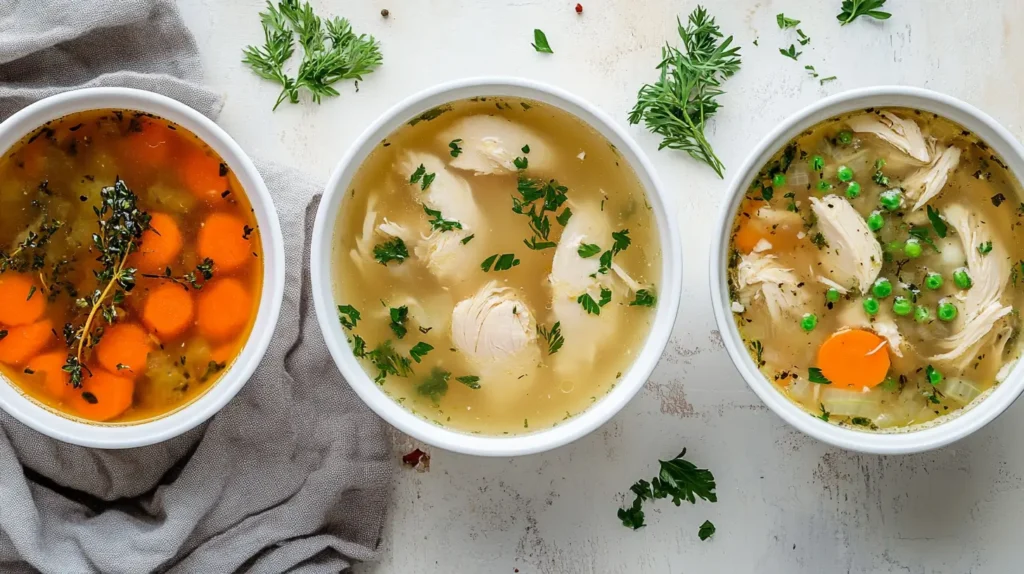A gluten-free diet has gained significant attention, not just among individuals with health conditions but also among those seeking healthier lifestyles. This dietary shift focuses on eliminating gluten—a protein found in wheat, barley, and rye—from daily consumption. The increasing availability of certified gluten-free broth, including essentials like chicken broth, underscores the growing demand for such alternatives. By choosing certified gluten-free options, individuals can enjoy rich flavors without the risk of gluten contamination, making mealtime safer and more enjoyable.
Table of Contents
What is Gluten and Why Should It Be Avoided?
Gluten is a structural protein responsible for the elasticity in dough, contributing to the chewy texture of baked goods. While harmless to many, gluten can trigger adverse reactions in individuals with specific health conditions. People with celiac disease, gluten sensitivity, or wheat allergies may experience digestive issues, inflammation, and long-term health complications if gluten is consumed.
Even for those without diagnosed conditions, some opt to avoid gluten due to perceived benefits such as reduced bloating, increased energy, and overall improved digestion.
Common Health Conditions That Require a Gluten-Free Diet
- Celiac Disease – An autoimmune disorder in which gluten consumption leads to damage in the small intestine, impairing nutrient absorption.
- Non-Celiac Gluten Sensitivity (NCGS) – Though not autoimmune, this condition triggers symptoms similar to celiac disease without intestinal damage.
- Wheat Allergy – A condition where the immune system reacts to proteins found in wheat, potentially causing severe allergic reactions.
- Dermatitis Herpetiformis – A skin condition linked to celiac disease, characterized by itchy, blistering rashes triggered by gluten ingestion.
Benefits of Choosing Gluten-Free Products
- Digestive Health – Reduces bloating, gas, and indigestion for sensitive individuals.
- Anti-Inflammatory Effects – Alleviates chronic inflammation linked to gluten-related conditions.
- Enhanced Energy – Some individuals report feeling more energetic and less fatigued.
- Weight Management – By eliminating processed foods containing gluten, many adopt healthier eating patterns.
The Gluten-Free Chicken Broth Market
As gluten-free diets become more mainstream, the demand for gluten-free alternatives to everyday pantry staples has soared. Chicken broth, a common ingredient in soups, sauces, and stews, is no exception. Many traditional broths contain gluten due to thickeners, preservatives, or flavor enhancers. Gluten-free chicken broth offers a safe option for those adhering to strict dietary restrictions.
Overview of Gluten-Free Certification
Products labeled gluten-free must meet strict standards to ensure safety. In the U.S., the Food and Drug Administration (FDA) mandates that gluten-free products contain less than 20 parts per million (ppm) of gluten. Certification by organizations like the Gluten-Free Certification Organization (GFCO) guarantees rigorous testing and compliance with industry standards.
What to Look for on Labels When Shopping for Gluten-Free Chicken Broth
- Certified Gluten-Free Seal – Indicates third-party testing and compliance with gluten-free standards.
- Ingredient List – Avoid products listing wheat, barley, rye, malt, or derivatives.
- Cross-Contamination Warnings – Choose brands that explicitly state their products are made in gluten-free facilities.
- Natural and Organic Options – Often free from artificial additives and preservatives, these are typically safer choices.
Top Brands of Certified Gluten-Free Broth
For those adhering to a gluten-free diet, selecting the right certified gluten-free broth is essential. Many popular brands now offer certified gluten-free broth options, ensuring safety without compromising on flavor. Below are some of the leading brands providing high-quality certified gluten-free broth for a variety of recipes.

Swanson Natural Goodness Chicken Broth
Swanson is a trusted household name known for its flavorful and versatile broths. The Swanson Natural Goodness Chicken Broth is labeled as a certified gluten-free broth, containing no artificial flavors or preservatives. It’s an excellent choice for soups, sauces, and marinades, delivering a rich chicken flavor with 33% less sodium than the regular version.
- Key Features:
- Certified gluten-free
- Lower sodium option
- Made from real chicken stock and vegetables
- Available in various sizes for convenience
Pacific Foods Organic Chicken Broth
Pacific Foods specializes in organic and natural products, and their Organic Chicken Broth is a top-tier gluten-free option. Crafted from free-range chicken, water, and organic vegetables, it guarantees clean ingredients and a robust flavor profile.
Key Features:
- USDA-certified organic
- Gluten-free and dairy-free
- No preservatives or additives
- Rich and natural flavor
If you’re interested in more organic, gluten-free options, consider checking out this Gluten-Free Campbell’s Chicken Broth, another trusted brand known for its quality and flavor.
Kettle & Fire Bone Broth
Kettle & Fire’s Bone Broth is a nutrient-dense, gluten-free choice that’s rich in collagen and amino acids. Made from slow-simmered bones, it’s perfect for sipping or incorporating into recipes for added nutrition.
Key Features:
- Certified gluten-free
- Non-GMO and organic ingredients
- High in collagen and protein
- Shelf-stable and long-lasting
Looking to create meals using gluten-free broths? Try this Gluten-Free Soup Recipe for an easy and delicious addition to your kitchen.
Kitchen Basics Original Chicken Broth
Kitchen Basics offers a Gluten-Free Original Chicken Broth praised for its rich, homemade taste. Made with real chicken, vegetables, and herbs, it’s a versatile broth suitable for a variety of dishes.
Key Features:
- Certified gluten-free
- No MSG or artificial flavors
- Low sodium
- Great for cooking and baking
If you’re looking for more gluten-free dining options, explore Chick-fil-A Gluten-Free Options for meals that cater to gluten-sensitive diets.
Alternative Brands and Options for Gluten-Free Broth
For those seeking more variety or homemade options, there are several gluten-free broth alternatives available.
Bone Broths: A Nutrient-Rich Gluten-Free Option
Bone broths are naturally gluten-free and packed with nutrients, making them an excellent alternative to traditional chicken broth. Many health-conscious brands offer bone broth infused with herbs and spices, providing not only flavor but also essential minerals and collagen.
Top Choices:
- Brodo – Known for artisan bone broths with deep flavors.
- Bare Bones – Offers organic bone broth with no preservatives.
- Ancient Nutrition – Specializes in protein-rich bone broths.
For more gluten-free options, check out Campbell’s Gluten-Free Chicken Broth, which is highly recommended for cooking, soups, and stews.
Homemade Chicken Broth as a Gluten-Free Option
Making chicken broth at home is a simple and cost-effective way to ensure it’s gluten-free. By simmering chicken bones, vegetables, and herbs, you can create a rich and flavorful broth tailored to your dietary needs.
Benefits of Homemade Broth:
- Complete control over ingredients
- No risk of cross-contamination
- Can be frozen for future use
- Customizable flavors and nutrient levels
Pro Tip: Use organic, free-range chicken and fresh vegetables to enhance the taste and nutritional value of your homemade broth. If you’re interested in gluten-free soup ideas, check out this Gluten-Free Soup Recipe for inspiration.
By selecting high-quality bone broths or making your own at home, you can ensure that your diet remains gluten-free, healthy, and delicious. Additionally, for more gluten-free meal ideas, visit Chick-fil-A Gluten-Free Options to discover alternatives for eating out while staying gluten-free.
These internal links guide readers to relevant, helpful content, enriching their understanding of gluten-free products and recipes.tables to enhance the quality and taste of your homemade broth.
How to Ensure Your Chicken Broth is Truly Gluten-Free
Ensuring that your chicken broth is genuinely gluten-free is crucial for those with celiac disease, gluten sensitivity, or wheat allergies. Even trace amounts of gluten can trigger adverse reactions. Knowing how to verify the safety of your broth can help prevent accidental gluten exposure.
Checking for Cross-Contamination
Cross-contamination can occur during manufacturing, transportation, or packaging, making it vital to scrutinize the production process. Here are key steps to avoid gluten contamination:
- Review Manufacturing Practices
- Look for brands that explicitly state their products are made in gluten-free facilities. This reduces the risk of gluten entering the production line through shared equipment.
- Some labels will indicate “Produced in a gluten-free facility,” which adds another layer of assurance.
- Examine Ingredient Lists Thoroughly
- Avoid broths containing wheat-based thickeners, malt, barley, or soy sauce. Hidden gluten can lurk in flavorings or preservatives.
- Ingredients like “modified food starch” or “natural flavors” may sometimes derive from gluten sources, so it’s essential to check for clarifying notes.
- Contact Manufacturers Directly
- If the label isn’t clear, reach out to the company to inquire about their gluten-free policies and production processes. Many brands have customer service lines specifically to address dietary concerns.
- Be Aware of Store Bulk Sections
- Avoid purchasing chicken broth from bulk bins or dispensers, as these can easily become contaminated by nearby gluten-containing products.
Understanding the Role of Gluten-Free Certification
Gluten-free certification adds an extra layer of confidence when selecting products. This certification ensures the broth has undergone rigorous testing and meets industry gluten-free standards.
- Look for Recognized Seals
- Gluten-Free Certification Organization (GFCO): Products with this seal contain less than 10 parts per million (ppm) of gluten, a stricter standard than the FDA’s requirement of 20 ppm.
- Certified Gluten-Free by NSF: NSF International is known for thorough product testing and auditing, ensuring gluten-free compliance.
- Celiac Support Association (CSA): This certification guarantees products contain less than 5 ppm of gluten, making it one of the most stringent certifications available.
- Check for Consistency
- Some companies may label one product as gluten-free while others in their line are not. Always verify each product individually rather than assuming all items from a brand are safe.
- FDA Gluten-Free Labeling
- In the U.S., products labeled “gluten-free” must meet the FDA standard of containing less than 20 ppm of gluten. However, this does not guarantee the absence of cross-contamination unless additional certifications are present.
FAQs About Gluten-Free Chicken Broth
Navigating the world of gluten-free products can raise many questions, especially when it comes to pantry staples like chicken broth. Below are answers to some frequently asked questions to help ensure you make informed choices.
Can Gluten-Free Chicken Broth Be Used in All Recipes?
Yes! Gluten-free chicken broth can seamlessly replace regular broth in any recipe. Whether you’re making soups, stews, sauces, gravies, or marinades, gluten-free broth provides the same rich flavor without compromising texture or quality.
- Tip: Use gluten-free chicken broth as a base for risottos, casseroles, and even pasta dishes. It’s versatile and enhances the taste of a wide range of meals.
How Can I Tell If a Broth Contains Gluten?
To determine if a chicken broth contains gluten, follow these steps:
- Check the Label – Look for “gluten-free” or gluten certification symbols (GFCO, NSF, or CSA).
- Read the Ingredients List – Avoid products containing wheat, barley, rye, malt, or soy sauce. Watch for terms like “natural flavors,” “hydrolyzed vegetable protein,” or “modified food starch,” which could be derived from gluten sources.
- Contact the Manufacturer – If the label is unclear, reach out to the company to confirm gluten-free status.
Pro Tip: Stick with brands that consistently label their products gluten-free to reduce uncertainty.
Are Gluten-Free Chicken Broths Always Organic?
No, gluten-free chicken broth is not always organic. While many organic broths are gluten-free by nature, the two labels indicate different attributes:
- Gluten-Free – Refers to the absence of gluten.
- Organic – Refers to the ingredients being grown without synthetic pesticides, fertilizers, or genetically modified organisms (GMOs).
If you prefer both organic and gluten-free options, look for broths labeled with “USDA Organic” and “Certified Gluten-Free.” Brands like Pacific Foods and Kettle & Fire offer products that meet both criteria.
What Are Some Good Gluten-Free Alternatives to Broth?
If you can’t find gluten-free chicken broth or want to try alternatives, consider the following options:
- Bone Broth – Naturally gluten-free, bone broth is nutrient-dense and packed with collagen, making it a great substitute.
- Vegetable Broth – Many vegetable broths are gluten-free and provide a lighter flavor, perfect for vegetarian dishes.
- Homemade Chicken Broth – Making broth at home guarantees it’s gluten-free. Use chicken, vegetables, herbs, and water to create a flavorful stock.
- Water with Seasoning – For recipes requiring minimal broth, use water mixed with gluten-free bouillon cubes or seasonings.
Conclusion: Choosing the Right Gluten-Free Chicken Broth
Selecting the right gluten-free chicken broth is essential for maintaining a healthy, safe, and flavorful diet. With the growing availability of certified gluten-free options, it’s easier than ever to find products that align with dietary restrictions without sacrificing taste or quality.
When shopping for gluten-free chicken broth, prioritize brands that are transparent about their ingredients and manufacturing processes. Look for trusted certifications, such as those from the Gluten-Free Certification Organization (GFCO) or NSF, to ensure the broth meets strict gluten-free standards. Additionally, always check labels for hidden sources of gluten and be mindful of potential cross-contamination.
For those seeking more control over their diet, homemade broth remains a reliable and customizable option. By using fresh ingredients and gluten-free spices, you can create a rich, flavorful broth that complements a wide range of recipes.
Ultimately, whether you choose a store-bought brand or make your own, selecting gluten-free chicken broth allows you to enjoy comforting, hearty meals with confidence. By staying informed and vigilant, you can continue to enjoy delicious, gluten-free cooking that nourishes and satisfies.


